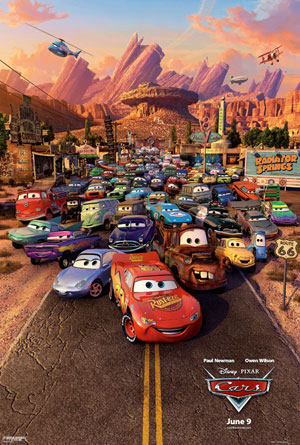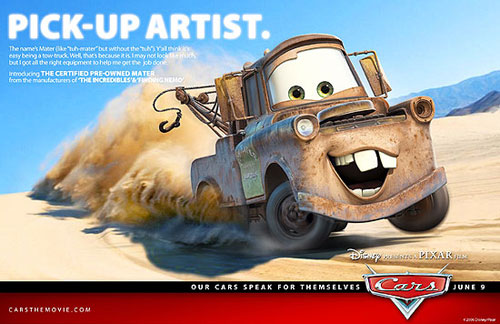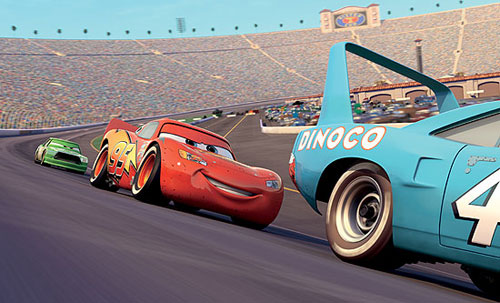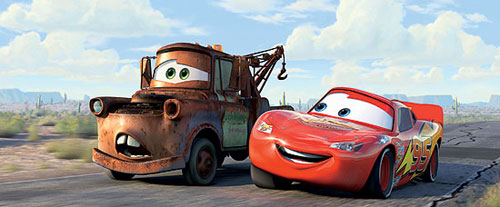 The
The
Loews Motor Speedway is enormous. It’s humongous. It’s gigantic. It’s
even approaching vast. For some of my dear readers this is not news,
but I’m an inveterate New York City boy, and I never even imagined that
I would ever watch a NASCAR race on television, let alone visit one of
the tracks where the races happen (or for that matter ever drive on the
track itself, even if it was for just a moment). But it was to this
monstrous oval that Disney brought journalists from all over the
country for the Cars junket and premiere.
I
didn’t stick around for the premiere (I had already seen the film back
in New York), or for the race that would be taking place at the
Speedway that weekend. I regret that – I was there at the track, I
might as well have gotten to see a race. I was hoping that Disney, who
had gone to all the expense of getting us to the staggeringly generic
city of Charlotte, North Carolina, would have arranged for a racing
demo. That wasn’t to be, but they did have real cars that had been
turned into characters from the movie. The cars that looked like hero
Lightning McQueen (voiced by Owen Wilson) and the crotchety old Doc
Hudson (Paul Newman) weren’t that exciting, but the tow truck made up
like Larry the Cable Guy’s Mater was terrifying – his giant buck teeth
were at chest level, and put me in mind of Maximum Overdrive. I was scared to get my hand too close to that thing.
Speaking
of Larry the Cable Guy, he was there. It was interesting meeting him,
since I despise him and everything he stands for. He showed up in his
“outfit” – shirt without sleeves (in flagrant violation of the track
rules! By the way, how shocked was I when Disney sent me an email
outlining the NASCAR race track’s dress code?) and a trucker cap, and
with his thick Cable Guy drawl on. What was fascinating though, was how
that accent would come and go. He would deliver some “Cable Guy” humor
in a thick drawl and then slip into a lighter accent when talking
seriously – it was almost schizoid to watch. Later we all wondered if
the guy ever turns it off, if he ever just talks like himself.
I
went to North Carolina with the intention of asking Larry the Cable Guy
about his racist and anti-gay jokes. I had done some research in
advance and saw that he had claimed that the only people who had a
problem with his act were “PC white people.”
Q:
My question is where is the line between being “un-PC” and being
racist? I have some quotes here of jokes that seem to cross that line:
“"Let me ask some of these commie rag head carpet flying wicker basket
on the head balancing scumbags something! Why do you hate us?” or
“Black Eye for the Queer Guy.”
[For the record, Larry
the Cable Guy is known for laughing at his own material on stage. He
also laughed at his own jokes as I read them back to him.]
Larry the Cable Guy:
You know what, I was doing social commentary on radio stations when I
first started out, and the thing I learned about radio was that number
one, you had to be funny for three minutes, number two, you had to be
outrageous, and number three, you have to make kind of a little point
in there somewhere along the way. I would go off on these tangents and
I would say as much stuff as I could to get people on the radio saying,
‘I can’t believe that guy just said that!’ Because at the time that was
what kept you on the air. That was back in the early 90s and late 80s
when you could say anything you wanted. After they started coming down
on radio I kind of chilled out on that stuff, because I wanted to stay
on the air.

You
know what, what I do is I’m a one-liner type of comedian. When people
would come to my shows they were surprised it was nothing like my
commentaries. Commentaries were one thing, my stand up act was another
thing. Did I get political in my stand up? A little bit, but I wouldn’t
get political if it wasn’t funny. I wasn’t up there saying something to
think I was better than you or smarter than you. If I was going to do a
joke about politics it was going to have a laugh, and it was going to
be eight seconds or ten seconds or I’m not doing it. So the stand up
act was really a lot different than that radio stuff.
Regardless
of what people say, I have a strange sense of humor and what I think is
funny is what I think is funny. My fanbase found me – I was doing radio
commentaries. I got an underground following and then when they came to
my shows and they found out it was way more than that then they just
came for the jokes. I got a great following. And my following is people
out to laugh and have a good time. They’re good folks, they’re not out
to hurt anybody, they just want to laugh and be entertained. They’re
sick of going to shows where there’s a comedian preaching at them for
an hour and a half: ‘I know this, I’m up here, I’m smarter than you,
you’re not laughing at the joke because it’s over your head.’ I’m like,
no, they’re not laughing at the joke cus it ain’t funny. I could never
get this trend in comedy where it’s funny to be not funny. I don’t get
it. You’re on stage to make people laugh, you’re not on stage to make
the comedians in the back of the room laugh. So I just have always gone
on stage and done what I think is funny. I don’t apologize for any of
it; I think it’s all hilarious and in good taste. If somebody would
follow me around in the course of the day they would be surprised at
all the different people that are fans of mine and love to laugh and
love comedy. They can call me controversial, whatever they want to call
me. I just don’t listen to them.
Q: But isn’t there a line between what’s funny and what’s hurtful?
Larry the Cable Guy:
Yeah there’s a line between what is and what isn’t. I try not to cross
that line. I know what my fans think is and isn’t and I cross that
bridge when I get to it. I know what jokes to push and what jokes not
to push, it just depends on crowd to crowd. You never know what kind of
crowd you’ll get in the course of the night. But I know what I want to
do. So I don’t do what I don’t want to do.

The next question was some local guy asking him about a line in the movie where Mater mishears the words “Piston Cup.”
The
answers Larry the Cable Guy gave were, to me, very vague. Obviously the
jokes I quoted weren’t from the early 90s, and just because your
audience eats up a gay bashing joke doesn’t make it a good joke to
tell. (It should be noted that I think Larry has the right to tell
whatever crummy jokes he wants, and that I don’t have a knee-jerk PC
reaction to all crude or racial jokes – I think Sarah Silverman is
brilliant, but her use of deeply offensive material arguably has a
layer of meaning beneath it). What’s troubling is the question of
whether or not a Larry the Cable Guy belongs in a kid’s film. What’s
doubly troubling is that his character, Mater, is the best character in
the film, the funniest thing in the film, and the very heart and soul
of the film. So not only does that mean kids are more likely to develop
an interest in this guy, it means I really liked a Larry the Cable Guy
performance.
Over the rest of the week I’ll be bringing you
interviews with Cars cast and filmmakers, including John Ratzenberger,
Cheech Marin, Route 66 expert and the voice of Sherriff Michael Wallis
(my favorite interview), and a rare audience with the great Paul Newman
(conducted in the middle of the race track, an area big enough to
support its own Dominos Pizza chain. Seriously. The track is so fucking
big.). Also look for some stuff from animators and producers and
production designers. We’re leading off with director John Lasseter,
who has recently found himself elevated to exceptional heights as the
result of the Disney/Pixar deal. For more on that, click here.
